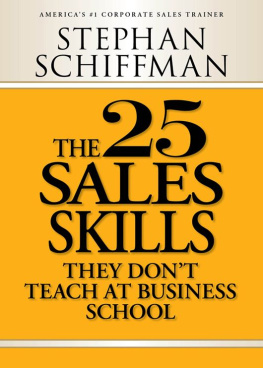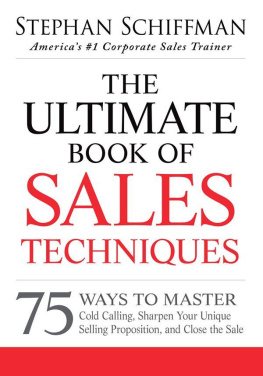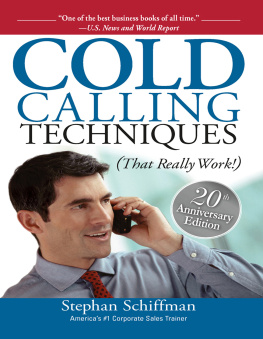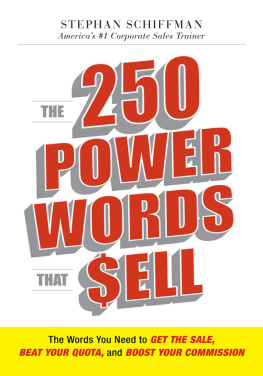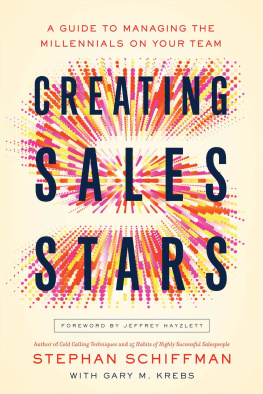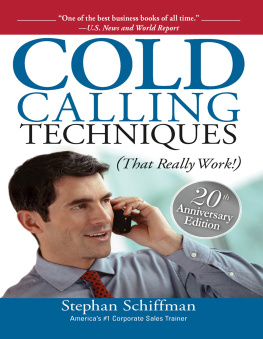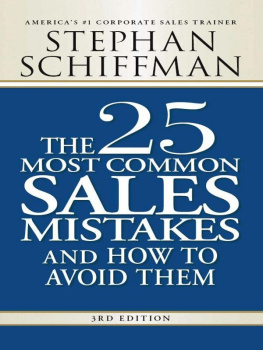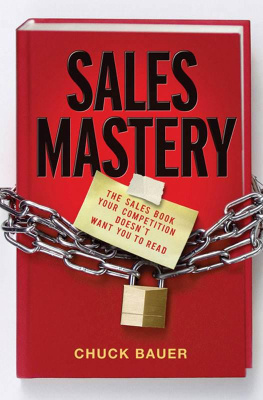
The 25 Sales Skills
They Dont Teach at Business School
by STEPHAN SCHIFFMAN
Americas #1 Corporate Sales Trainer

Contents
Introduction: The Hidden Sales Curriculum
Some elements of selling you may learn in a classroom. Others come from experience. In this book, Ive tried to incorporate both.
The inspiration for the volume youre holding in your hands arose from a discussion I had with my daughter Jennifer, who recently graduated from college. Jennifer pointed out that certain core skills are part of a standard educationreading and math, for instancebut that the adaptation of those skills to the real world is dependent on another lesson entirely. This informal lesson may be more important than the nuts and bolts course of study that must precede it.
A subject like learning to order from a menu at a good restaurant isnt specifically covered when were taught to read. Similarly, no one teaches us how to select a topic of conversation that will open up a group of cautious strangers during those first few strained moments of a party. (Apparently, this type of topic is never covered in courses called social studies.) These skills, and many others, Jennifer continued, must be acquired by each of us as we go along, out there in the real world.
It occurred to me that much the same thing is true of the world of sales. Certain basic skills are taughtand retaughtto help salespeople expand their contact base, connect the people in that base to various products and services, and increase their income. And yet veteran salespeople possess skills that go beyond thisskills that most new salespeople dont have, skills that training seminars, business school courses, and formal sessions in sales school simply dont cover.
I call this the hidden curriculum of the sales world. And Ive tried to write about it in this book. This essential curriculum comprises the authentic sales lessons that experienced salespeople always seem to learn from the environment rather than from a business course or training seminar.
Salespeople also learn from one another, of course. Every one of the chapters in this book is based on a question Ive received from one of our own salespeople. Since I still sell for a living, Im able to offer anecdotes and suggestions based on recent experience. What appears on the following pages is, in essence, in answer to the questions that come after you implement the good ideas and strategies you learn in a marketing class or sales training seminar.
If youre interested in learning how to have great conversations with prospects virtually every time out, how to spot bad selling advice on the Internet, how to use questions to increase your average value per account, when it makes sense to ask a question you know your prospect cant answer, or why making a mistake in front of a prospect is sometimes the best thing you can dothis book is for you. You wont learn any of this in schoolbut you will learn about it here.
What follows is some insider advice culled from twenty-seven years of face-to-face selling. You may have to implement the ideas in the main section of this book without the help of an instructor, but once you become familiar with these concepts, my guess is that youll wonder why they dont teach this stuff in sales school.
Until the formal curriculum is updated to reflect something more expansive than the traditional selling admonitions, I hope this book will point you in the right direction.
Stephan Schiffman
Skill #1
Beware of Bad Advice on the Internet
How much should I trust what I read on the Internet about sales?
The Internet has changed the way many people sell. Few of us could have imagined, six or seven years ago, how easy it would become to gain access to some of the most vital daily selling information. Researching a company? You can now check for its Web site easily. Hungry for new leads? Dozens of online resources can point you toward new people and companies to contact. Looking for advice on how to improve your selling technique? Hundreds of (self-appointed) sales experts are only a click away.
And this is where you can get yourself into trouble. Too many sales gurus use their sites to dispense advice that can sabotage the job of building a relationship with your prospect. Consider the following:
Bad advice: Dont work with the prospect to develop a plan that makes senseinstead, use pressure tactics. A site we visited encouraged salespeople to ask this question when face to face with a hesitant contact: Now, dont you agree that this product can help you or would be of benefit to you? Ouch. A better approach Would be to ask, What exactly are you trying to get accomplished in this area?
Bad advice: Find the pain. Several sites we encountered advised salespeople to use questions to plant subliminal hints designed to get prospects to reveal that they actually hate their current vendor. Examples: Do you also worry about ? How tough a position does that put you in? Instead of trying to find the painwhich may or may not existsalespeople should focus on finding out what the prospect actually does.
Bad advice: Always be closing. This outdated maxim showed up as constructive advice on more than one of the sales sites we visited, as did any number of manipulative closing tricks that will quickly destroy emerging relationships. More pragmatic advice: Always be asking questions. At the conclusion of an in-depth information-gathering periodwhich should occupy 75 percent of any sales processyou can present a plan that makes sense to the other person, and close by asking, It makes sense to mewhat do you think?
The bottom line: Its too easy to set up a Web sitewhich makes it hard to find a good one with relevant, responsible information for salespeople. Beware of the advice you take from the Internet.
Skill #2
Use Company Events to Move the Relationship Forward
Ive lost ground with a couple of former prospects who asked me to keep in touch the last time I spoke to them. I want to win some action in these relationships after a few dormant weeks (or months!). How do I do it?
Thanks for calling to confirmbut Im afraid Im going to have to cancel our meeting for next week. Weve decided to put a hold on all our spending in this area for now. Well be reevaluating in a couple of months. Keep in touch, all right?
Its part of the sales landscapea law as dependable as gravity No matter how effective, persuasive, or experienced a given salesperson is, some percentage of that persons promising leads will turn into opportunities. These are static contacts that arent moving through the sales process and cant be counted on to provide incomeat least for the time being.
The question really isnt whether contacts will fall into the opportunity category but what steps to take when they do. How do you reignite interest and generate activity within your list of cold prospects? Canadian sales representative Gino Sette came up with an interesting strategy.
Gino decided to write a letter to every prospect who had decided not to buy from him over a given period. Basically, the letter said this: It was a pleasure meeting with you a while back to talk about what your company was doing. Even though we were unable to move forward at that time, Im still thinking about you.
Gino then invited each cold contact to sit in at one of his companys upcoming events. This will give you an opportunity to evaluate, firsthand how applicable what we do is to your business environment, he wrote. Attached is a list of all upcoming training where my clients have approved outside observers. Ive also included a brief description of each of the programs.
Next page
